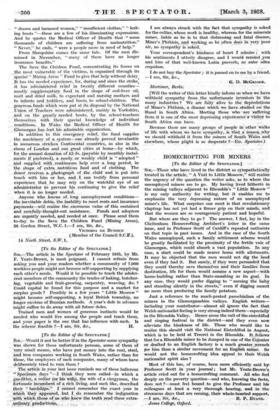HOMECROFTING FOR MINERS
[To the Editor of the &smarm:Li-
'Snr,—Those whti have lived in the district so sympathetically treated in the article, " A Visit to Little Moscow," will realize the urgency of the question the writer asks, as to where the unemployed miners are to go. My having lived hithertb in 'the mining valleys adjacent to Rhondda's " Little Moscow " is. my only authority for writing, but it enables me to emphasize the very depressing nature of an unenipIoyed miner's life. What surprises one most is that revolutionary "claptrap has not yet had a firmer grip on their minds, and that the women are so courageously patient and hopeful.
But where are they to go ? The answer," I feel, lay in the Cheltenham Homecrofting Architect's letter in the same issue, and in PrOfessor Scott of Cardiff's repeated outbursts on that topic in past issues. And in the case of the South Wales unemployed, such a family settlement scheme would be greatly facilitated by the proximity of the fertile vale of Glamorgan, which could absorb a vast population. In any case, a start could be made nearer home with allotments. It may be objected that the men would not dig the land even if they had it. But surely, if they were persuaded that they could thereby save themselves and their families from destitution, life for them would assume a new aspect—with home-building rather than State-smashing as its goal. In any case, they would prefer digging to " nursing the baby and standing silently in the streets," even if digging meant no more than producing the family potatoes.
Just a reference to the much-prated parochialism of the, miners in the Glamorganshire valleys. English writers— including your contributor—almost all ignore the fact that Welsh nationalist feeling is very strong indeed there—especially in the Rhondda Valley. Hence arose the cult of the eisteddfod and singing festival in the district—and they even now alleviate the bleakness of life. Those who would like to realize this should visit the National Eisteddfod in August, which is to be held at Treorci in the Rhondda. It. follows that for a Rhondda miner to be dumped in one of the 'Colonies or drafted to an English factory is a much greater ,wrench for him than a similar movement for an English miner. So would not the homecrofting idea appeal to their Welsh nationalist spirit also ?
Most of this has, of course, been more efficiently said by Professor Scott in your journal ; but Mr. Yeats-Brown's article cried out for a homecrofting comment. All who feel _deeply on the poverty question—and who, knowing the facts, does not ?—must feel bound to give the Professor and his colleagues at .Ieast a very thorough hearing, and in the strenuous days that are coming, their whole-hearted support.
Jesus College, Oxford. _ _ _






























































 Previous page
Previous page